| Chess Olympiad | |
|---|---|
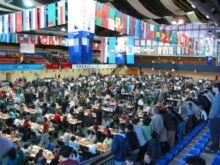 35th Chess Olympiad in Bled in October 2002 | |
| Status | Active |
| Genre | Sports Event |
| Frequency | Biannual |
| Location(s) | Various |
| Inaugurated | 1924 |
| Organised by | FIDE |
The Chess Olympiad is a biennial chess tournament in which teams representing nations of the world compete. FIDE organises the tournament and selects the host nation. Amidst the COVID-19 pandemic, FIDE held a one-off Online Chess Olympiad with a rapid time control that affected players' online ratings.
The use of the name "Chess Olympiad" for FIDE's team championship is of historical origin and implies no connection with the Olympic Games.
Birth of the Olympiad
The first Olympiad was unofficial. For the 1924 Olympics an attempt was made to include chess in the Olympic Games but this failed because of problems with distinguishing between amateur and professional players.[1] While the 1924 Summer Olympics was taking place in Paris, the 1st unofficial Chess Olympiad also took place in Paris. FIDE was formed on Sunday, July 20, 1924, the closing day of the 1st unofficial Chess Olympiad.[2]
FIDE organised the first Official Olympiad in 1927 which took place in London.[1] The Olympiads were occasionally held annually and at irregular intervals until World War II; since 1950 they have been held regularly every two years.[1]
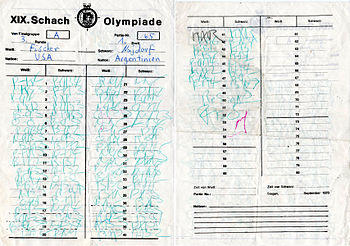
Drug testing
As a sporting federation recognized by the IOC, and particularly as a signatory to the World Anti-Doping Agency (WADA) conventions,[3] FIDE adheres to their rules, including a requirement for doping tests,[4][5] which they are obligated to take at the events such as the Olympiad. The tests were first introduced in 2002 under significant controversy,[6] with the widespread belief that it was impossible to dope in chess. Research carried out by the Dutch chess federation failed to find a single performance-enhancing substance for chess.[7] According to Dr Helmut Pfleger, who has been conducting experiments in the field for around twenty years, "Both mentally stimulating and mentally calming medication have too many negative side effects".[7] Players such as Artur Yusupov,[8] Jan Timman[9] and Robert Hübner[10] either refused to play for their national team or to participate in events such as the Chess Olympiad where drug tests were administered. All 802 tests administered at the 2002 Olympiad came back negative.[11] However, in the 36th Chess Olympiad in 2004, two players refused to provide urine samples and had their scores cancelled.[12][13] Four years later, Vassily Ivanchuk was not penalized for skipping a drug test at the 38th Chess Olympiad in 2008, with a procedural error being indicated instead.[14]
In 2010, a FIDE official commented that due to the work of the FIDE Medical Commission, the tests were now considered routine.[15] In November 2015, FIDE president Kirsan Ilyumzhinov announced they are working with WADA to define and identify doping in chess.[16]
Competition
Each FIDE recognized chess association can enter a team into the Olympiad.[1] Each team is made of up to five players, four regular players and one reserve (prior to the tournament in Dresden 2008 there were two reserves[17]).[1] Initially each team played all other teams but as the event grew over the years this became impossible.[1] At first team seeding took place before the competition.[1] Later certain drawbacks were recognized with seeding and in 1976 a Swiss tournament system was adopted.[1]
The trophy for the winning team in the open section is the Hamilton-Russell Cup,[1] which was offered by the English magnate Frederick Hamilton-Russell as a prize for the 1st Olympiad (London 1927). The cup is kept by the winning team until the next event, when it is consigned to the next winner. The trophy for the winning women's team is known as the Vera Menchik Cup in honor of the first Women's World Chess Champion.
Results
| Year | Event | Host | Gold | Silver | Bronze |
|---|---|---|---|---|---|
| 1924 | 1st unofficial Chess Olympiad The Chess Olympiad (individual) | ||||
| 1926 | 2nd unofficial Chess Olympiad The Team Tournament (part of FIDE summit) | ||||
| 1927 | 1st Chess Olympiad | ||||
| 1928 | 2nd Chess Olympiad | ||||
| 1930 | 3rd Chess Olympiad | ||||
| 1931 | 4th Chess Olympiad | ||||
| 1933 | 5th Chess Olympiad | ||||
| 1935 | 6th Chess Olympiad | ||||
| 1936 | 3rd unofficial Chess Olympiad non-FIDE unofficial Chess Olympiad | ||||
| 1937 | 7th Chess Olympiad | ||||
| 1939 | 8th Chess Olympiad | ||||
| 1950 | 9th Chess Olympiad | ||||
| 1952 | 10th Chess Olympiad | ||||
| 1954 | 11th Chess Olympiad | ||||
| 1956 | 12th Chess Olympiad | ||||
| 1958 | 13th Chess Olympiad | ||||
| 1960 | 14th Chess Olympiad | ||||
| 1962 | 15th Chess Olympiad | ||||
| 1964 | 16th Chess Olympiad | ||||
| 1966 | 17th Chess Olympiad | ||||
| 1968 | 18th Chess Olympiad | ||||
| 1970 | 19th Chess Olympiad | ||||
| 1972 | 20th Chess Olympiad | ||||
| 1974 | 21st Chess Olympiad | ||||
| 1976 | 22nd Chess Olympiad * | ||||
| 1976 | Against Chess Olympiad | ||||
| 1978 | 23rd Chess Olympiad | ||||
| 1980 | 24th Chess Olympiad | ||||
| 1982 | 25th Chess Olympiad | ||||
| 1984 | 26th Chess Olympiad | ||||
| 1986 | 27th Chess Olympiad | ||||
| 1988 | 28th Chess Olympiad | ||||
| 1990 | 29th Chess Olympiad | ||||
| 1992 | 30th Chess Olympiad | ||||
| 1994 | 31st Chess Olympiad | ||||
| 1996 | 32nd Chess Olympiad | ||||
| 1998 | 33rd Chess Olympiad | ||||
| 2000 | 34th Chess Olympiad | ||||
| 2002 | 35th Chess Olympiad | ||||
| 2004 | 36th Chess Olympiad | ||||
| 2006 | 37th Chess Olympiad | ||||
| 2008 | 38th Chess Olympiad | ||||
| 2010 | 39th Chess Olympiad | ||||
| 2012 | 40th Chess Olympiad | ||||
| 2014 | 41st Chess Olympiad | ||||
| 2016 | 42nd Chess Olympiad | ||||
| 2018 | 43rd Chess Olympiad | ||||
| 2021 | 44th Chess Olympiad † | ||||
| 2022 | 45th Chess Olympiad | ||||
| 2023 | 46th Chess Olympiad |
* In 1976, the ![]() Soviet Union, other communist countries and Arabic countries did not compete for political reasons.
Soviet Union, other communist countries and Arabic countries did not compete for political reasons.
† The 2021 event was originally scheduled for 2020, but postponed due to the COVID-19 pandemic. FIDE also organized an online olympiad.
Starting from 2008, the first criterion for determining ranking is match point instead of board point. Team scores 2 points for a win, 1 point for a draw and 0 points for a loss (that is, a 4-0 win or 2.5-1.5 win will get the same match point).
Total team ranking
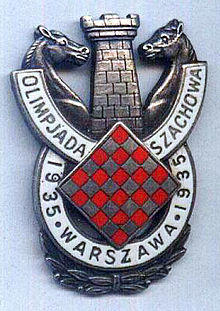
The table contains the Open teams ranked by the medals won at the Chess Olympiad (not including the unofficial events), ranked by the number of first place medals, ties broken by second-place medals, etc.
| Rank | Nation | Gold | Silver | Bronze | Total |
|---|---|---|---|---|---|
| 1 | 18 | 1 | 0 | 19 | |
| 2 | 6 | 6 | 8 | 20 | |
| 3 | 6 | 3 | 3 | 12 | |
| 4 | 3 | 7 | 2 | 12 | |
| 5 | 3 | 0 | 3 | 6 | |
| 6 | 2 | 2 | 3 | 7 | |
| 7 | 2 | 1 | 0 | 3 | |
| 8 | 1 | 6 | 6 | 13 | |
| 9 | 1 | 2 | 3 | 6 | |
| 10 | 1 | 1 | 3 | 5 | |
| 11 | 0 | 3 | 3 | 6 | |
| 12 | 0 | 3 | 2 | 5 | |
| 13 | 0 | 2 | 1 | 3 | |
| 14 | 0 | 1 | 1 | 2 | |
| 0 | 1 | 1 | 2 | ||
| 0 | 1 | 1 | 2 | ||
| 17 | 0 | 1 | 0 | 1 | |
| 0 | 1 | 0 | 1 | ||
| 0 | 1 | 0 | 1 | ||
| 20 | 0 | 0 | 1 | 1 | |
| 0 | 0 | 1 | 1 | ||
| 0 | 0 | 1 | 1 | ||
| Totals (22 nations) | 43 | 43 | 43 | 129 | |
Best individual results in the open section
The best individual results in order of overall percentage are:
| Rank | Player | Country | Ol. | Gms. | + | = | – | % | Medals | Number of medals |
|---|---|---|---|---|---|---|---|---|---|---|
| 1 | Mikhail Tal | 8 | 101 | 65 | 34 | 2 | 81.2 | 5 – 2 – 0 | 7 | |
| 2 | Anatoly Karpov | 6 | 68 | 43 | 23 | 2 | 80.1 | 3 – 2 – 0 | 5 | |
| 3 | Tigran Petrosian | 10 | 129 | 78 | 50 | 1 | 79.8 | 6 – 0 – 0 | 6 | |
| 4 | Isaac Kashdan | 5 | 79 | 52 | 22 | 5 | 79.7 | 2 – 1 – 2 | 5 | |
| 5 | Vasily Smyslov | 9 | 113 | 69 | 42 | 2 | 79.6 | 4 – 2 – 2 | 8 | |
| 6 | David Bronstein | 4 | 49 | 30 | 18 | 1 | 79.6 | 3 – 1 – 0 | 4 | |
| 7 | Garry Kasparov | 8 | 82 | 50 | 29 | 3 | 78.7 | 3 – 1 – 2 | 6 | |
| 8 | Alexander Alekhine | 5 | 72 | 43 | 27 | 2 | 78.5 | 2 – 2 – 0 | 4 | |
| 9 | Milan Matulović | 6 | 78 | 46 | 28 | 4 | 76.9 | 1 – 2 – 0 | 3 | |
| 10 | Paul Keres | 10 | 141 | 85 | 44 | 12 | 75.9 | 5 – 1 – 1 | 7 | |
| 11 | Efim Geller | 7 | 76 | 46 | 23 | 7 | 75.6 | 3 – 3 – 0 | 6 | |
| 12 | James Tarjan | 5 | 51 | 32 | 13 | 6 | 75.5 | 2 – 1 – 0 | 3 | |
| 13 | Bobby Fischer | 4 | 65 | 40 | 18 | 7 | 75.4 | 0 – 2 – 1 | 3 | |
| 14 | Mikhail Botvinnik | 6 | 73 | 39 | 31 | 3 | 74.7 | 2 – 1 – 2 | 5 | |
| 15 | Sergey Karjakin | 8 | 47 | 24 | 22 | 1 | 74.7 | 2 – 0 – 1 | 3 | |
| 16 | Salo Flohr | 7 | 82 | 46 | 28 | 8 | 73.2 | 2 – 1 – 1 | 4 |
- Notes
- Only players participating in at least four Olympiads are included in this table.
- Medals indicated are only individual ones (not team), in the order gold - silver - bronze.
- Garry Kasparov played his first four Olympiads for the Soviet Union, the rest for Russia. His four gold medals are one for best-rating performance (first introduced at Thessaloniki 1984) and three for best score on first board.
- Paul Keres played his first three Olympiads for Estonia, the rest for the Soviet Union.
- Sergey Karjakin played his first three Olympiads for Ukraine, the rest for Russia
See also
- Women's Chess Olympiad
- World Team Chess Championship
- European Team Chess Championship
- World Chess Championship
- Women's World Chess Championship
- Russia (USSR) vs Rest of the World
- European Chess Club Cup
- World Mind Sports Games
- Mind Sports Organisation
- Correspondence Chess Olympiad
References
- ^ a b c d e f g h i Brace, Edward R. (1977), An Illustrated Dictionary of Chess, Hamlyn Publishing Group, p. 64, ISBN 1-55521-394-4
- ^ FIDE History by Bill Wall. Retrieved 2 May 2008.
- ^ "Code Signatories". World Anti-Doping Agency. Retrieved 16 October 2017.
- ^ Complete FIDE Anti-Doping Documents FIDE official website. Retrieved 2 May 2008.
- ^ AM. "Chess WADA – Anti-Doping Policy, Nutrition and Health". www.fide.com. Retrieved 16 October 2017.
- ^ Open letter from 50 players on drug testing (Web Archive)
- ^ a b "Controversy over FIDE doping check". 27 October 2002. Retrieved 16 October 2017.
- ^ "Controversy over FIDE doping check". 27 October 2002. Retrieved 16 October 2017.
- ^ "The Hindu : Indian men beat U.S." www.thehindu.com. Retrieved 16 October 2017.
- ^ Grossekathöfer, Maik (11 December 2008). "Outrage Over Ivanchuk: The Great Chess Doping Scandal". Retrieved 16 October 2017 – via Spiegel Online.
- ^ "Top Chess Blogs - Chess.com". Chess.com. Retrieved 16 October 2017.
- ^ "Decision of the FIDE Doping Hearing Panel (Miller)" (PDF). Retrieved 16 October 2017.
- ^ "Decision of the FIDE Doping Hearing Panel (Press)" (PDF). Retrieved 16 October 2017.
- ^ "Decision of the FIDE Doping Hearing Panel". www.fide.com. Retrieved 16 October 2017.
- ^ Minutes of 2010 FIDE General Assembly (page 24)
- ^ "ФИДЕ и ВАДА будут совместно выявлять допинг в шахматах". 24 November 2015. Retrieved 16 October 2017.
- ^ FIDE submits regulation changes for Chess Olympiad Fide.com
External links
- FIDE Handbook: Chess Olympiads
- OlimpBase: Chess Olympiads
- Student Chess Olympiad - World Student Team Chess Championship
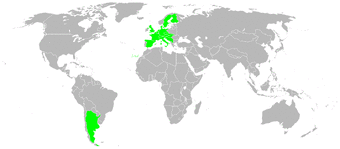
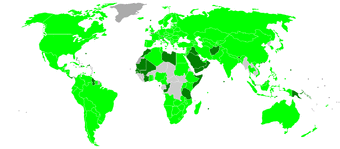
_gegen_Fischer_(USA).jpg)